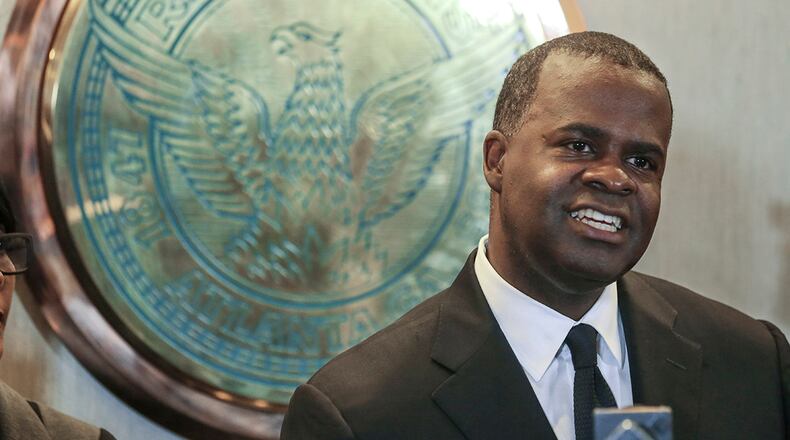For Atlanta Mayor Kasim Reed, more money for MARTA is an all-or-nothing proposition.
If the regional transit system can't get half a penny of a proposed new penny sales tax across Fulton County, Reed said Tuesday, it might as well not get anything — at least not for two more years.
Reed is trying to strong-arm a group of mayors and county commissioners who have been meeting for months to reach a compromise about how to split a potential windfall that would help fund transportation improvements — and who need unanimity from the county and each of Fulton's cities to take their referendum to voters.
"The future of this city and this region is going to be transit based," Reed said after a meeting of Fulton County mayors as they negotiate the terms of the potential new penny sales tax for transportation.
But if MARTA is not going to be fully funded with half of the tax, he said, the transportation tax that mayors and commissioners have been negotiating for months “should not move forward at all.”
“I’m going to oppose that referendum,” Reed said. “Folks can do this in 2018.”
Fulton leaders have been negotiating a compromise that would allow them to bring a penny sales tax before voters this fall. If approved, the tax could collect close to $1 billion over five years that would be used to repave roads and pay for sidewalks, bike lanes and transit options.
How much money MARTA might get, though, is a point of contention.
“The future looks great with MARTA. Without MARTA, we’re a second tier city and we’re out of the running,” Roswell Mayor Jere Wood said. “If he (Reed) postpones for two years, that doesn’t work.”
Reed has held a hard line that the split should be 50/50 between MARTA and roads. On the opposite side, Alpharetta Mayor David Belle Isle said he has not yet been convinced that the money put toward MARTA would benefit a large enough portion of the population to justify the expense.
In order for the penny tax to be put to voters, and for the population-based distribution method that has been agreed upon to be used, the county and all its cities have to reach a consensus about how the money will be spent.
“Somehow, we’ve decided that MARTA is the answer, and now we must justify it,” Belle Isle said. “We may have to be the dissent.”
There is divide, though, within the city itself. The bill that would allow MARTA access to more money is sponsored by an Alpharetta Republican, State Sen. Brandon Beach.
The opportunity cost of waiting to make a decision could be phenomenal, Beach said.
He said work on the I-285 and Ga. 400 interchange will snarl traffic for years, and would be an opportunity to change people’s habits and get them to use transit.
Beach on Tuesday said he would amend the bill before the senate transportation committee to allow expanded MARTA funding. A compromise bill could allow Atlanta and Fulton county to tax for MARTA at different rates — half a penny in Atlanta and a quarter penny in Fulton, with the remainder of each penny going to roads or other non-MARTA projects for the five-year period of the tax.
A proposal that would allow MARTA to pick up additional money after five years had largely been agreed on in the past, but also suffered setbacks as conversations continued.
The disagreements, Chattahoochee Hills Mayor Tom Reed said, are a reflection of the Balkanization of Atlanta.
“Unfortunately, people forget that we live and die as a region,” he said.
Liz Hausmann, Fulton County's vice chairman, said she thought voters should have the opportunity to make a decision about potential transportation solutions, even if it affected political careers. Fulton's county manager, Dick Anderson, said he was still confident a compromise could be reached.
“There’s no agreement in doing nothing,” he said. “For political leaders to decide to do nothing will be readily rejected.”
About the Author
Keep Reading
The Latest
Featured




